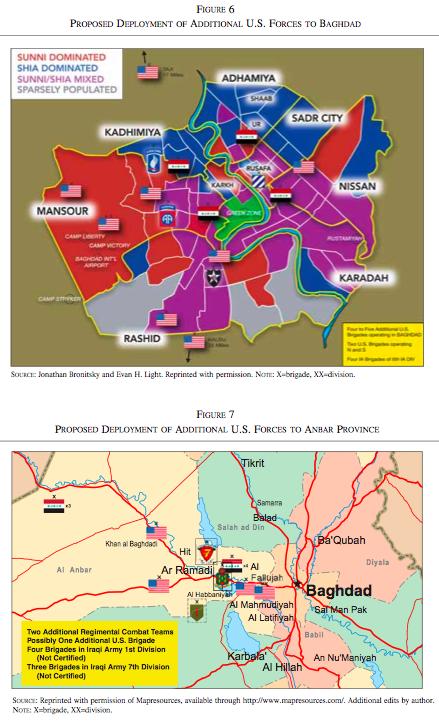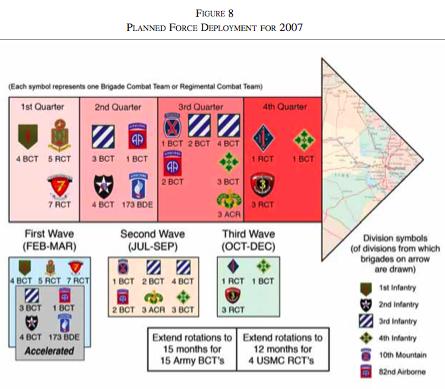 Frederick W. Kagan and General Jack Keane (USA, ret.) have created a plan worth your Saturday morning reading. This runs right into the face of the Iraq Studies Group (remember, it was run by retired politicians, diplomats and party functionaries - with the expected results [BTW, I read it, have you?]) and Speaker Pelosi/Senator Reid Surrender Plan.
Frederick W. Kagan and General Jack Keane (USA, ret.) have created a plan worth your Saturday morning reading. This runs right into the face of the Iraq Studies Group (remember, it was run by retired politicians, diplomats and party functionaries - with the expected results [BTW, I read it, have you?]) and Speaker Pelosi/Senator Reid Surrender Plan.To keep Darth Skippy happy, it is also a kick in the a55 to the Bush Admin. It sounds like we are heading in the direction this Plan calls for, but we'll see. If I was running the J5 shop at K2's place, I would have called this COA "Double Down." This is unquestionably an Operational Plan (OPLAN). It even covers possible Branches and Sequels. At only 50 pages though, it is about as thorough a "bang for a buck" OPLAN I have seen. I like the compact nature, and feel a little bit of envy that (a little inside baseball here) we don't have the ability to produce something this readable.
Their OPLAN Executive Summary can be read here and you will find there another link to the full report. It was presented at a Conference yesterday at the American Enterprise Institute. You can get the audio and video downloaded from here. Also speaking are Senators McCain and Lieberman. If you don't want to follow the link, the Executive Summary is below - it is worth the space. The maps in this post outline their recommended deployment plan.
This is a Plan worthy of our nation. One I support. In their presentation (video and audio link) they also acknowledge the 800# gorilla in the room. Our Army (editor's note: and Marine Corps) is too small for present and future operations. To think or say other is folly.Victory is still an option in Iraq. America, a country of 300 million people with a GDP of $12 trillion and more than 1 million soldiers and Marines, has the resources to stabilize Iraq, a state the size of California with a population of 25 million and a GDP under $100 billion. America must use its resources skillfully and decisively to help build a successful democratically elected, sovereign government in Iraq.
Victory in Iraq is vital to America’s security. Defeat will likely lead to regional conflict, humanitarian catastrophe, and increased global terrorism.
Iraq has reached a critical point. The strategy of relying on a political process to eliminate the insurgency has failed. Rising sectarian violence threatens to break America’s will to fight. This violence will destroy the Iraqi government, armed forces, and people if it is not rapidly controlled.
Victory in Iraq is still possible at an acceptable level of effort. We must adopt a new approach to the war and implement it quickly and decisively.
We must act now to restore security and stability to Baghdad. We and the enemy have identified it as the decisive point.
There is a way to do this.
- We must balance our focus on training Iraqi soldiers with a determined effort to secure the Iraqi population and contain the rising violence. Securing the population has never been the primary mission of the U.S. military effort in Iraq, and now it must become the first priority.
- We must send more American combat forces into Iraq and especially into Baghdad to support this operation. A surge of seven Army brigades and Marine regiments to support clear-and-hold operations that begin in the spring of 2007 is necessary, possible, and will be sufficient to improve security and set conditions for economic development, political development, reconciliation, and the development of Iraqi Security Forces (ISF) to provide permanent security.
- American forces, partnered with Iraqi units, will clear high-violence Sunni and mixed Sunni-Shia neighborhoods, primarily on the west side of the city.
- After those neighborhoods are cleared, U.S. soldiers and Marines, again partnered with Iraqis, will remain behind to maintain security, reconstitute police forces, and integrate police and Iraqi Army efforts to maintain the population’s security.
- As security is established, reconstruction aid will help to reestablish normal life, bolster employment, and, working through Iraqi officials, strengthen Iraqi local government.
- Securing the population strengthens the ability of Iraq’s central government to exercise its sovereign powers.
This approach requires a national commitment to victory in Iraq:
- The ground forces must accept longer tours for several years. National Guard units will have to accept increased deployments during this period.
- Equipment shortages must be overcome by transferring equipment from non-deploying active-duty, National Guard, and reserve units to those about to deploy. Military industry must be mobilized to provide replacement equipment sets urgently.
- The president must request a dramatic increase in reconstruction aid for Iraq. Responsibility and accountability for reconstruction must be assigned to established agencies. The president must insist upon the completion of reconstruction projects. The president should also request a dramatic increase in Commander’s Emergency Response Program (CERP) funds.
- The president must request a substantial increase in ground forces end strength. This increase is vital to sustaining the morale of the combat forces by ensuring that relief is on the way. The president must issue a personal call for young Americans to volunteer to fight in the decisive conflict of this generation.
- The president and his representatives in Iraq must forge unity of effort with the Iraqi government.
Other courses of action have been proposed. All will fail.
- Withdraw immediately. This approach will lead to immediate defeat. The Iraqi Security Forces (ISF) are entirely dependent upon American support to survive and function. If U.S. forces withdraw now, the Iraqi forces will collapse. Iraq will descend into total civil war that will rapidly spread throughout the Middle East.
- Engage Iraq’s neighbors. This approach will fail. The basic causes of violence and sources of manpower and resources for the warring sides come from within Iraq. Iraq’s neighbors are encouraging the violence, but they cannot stop it.
- Increase embedded trainers dramatically. This approach cannot succeed rapidly enough to prevent defeat. Removing U.S. forces from patrolling neighborhoods to embed them as trainers will lead to an immediate rise in violence. This rise in violence will destroy America’s remaining will to fight and escalate the cycle of sectarian violence in Iraq beyond anything an Iraqi army could bring under control.
Failure in Iraq today will require far greater sacrifices tomorrow in far more desperate circumstances.
Committing to victory now will demonstrate America’s strength to our friends and enemies around the world.










No comments:
Post a Comment